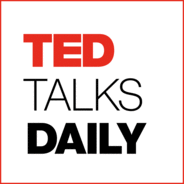Humans are no longer valued for our creativity, says media theorist Douglas Rushkoff -- in a world dominated by digital technology, we're now just valued for our data. In a passionate talk, Rushkoff urges us to stop using technology to optimize people for the market and start using it to build a future centered on our pre-digital values of connection, creativity and respect. "Join 'Team Human.' Find the others." he says. "Together let's make the future that we always wanted."For a chance to give your own TED Talk, fill out the Idea Search Application: ted.com/ideasearch.Interested in learning more about upcoming TED events? Follow these links:TEDNext: ted.com/futureyouTEDSports: ted.com/sportsTEDAI Vienna: ted.com/ai-viennaTEDAI San Francisco: ted.com/ai-sf Hosted on Acast. See acast.com/privacy for more information.

Bildung
TED Talks Daily Folgen
Want TED Talks on the go? Everyday, this feed brings you our latest talks in audio format. Hear thought-provoking ideas on every subject imaginable – from Artificial Intelligence to Zoology, and everything in between – given by the world's leading thinkers and doers. This collection of talks, given at TED and TEDx conferences around the globe, is also available in video format. Hosted on Acast. See acast.com/privacy for more information.
Folgen von TED Talks Daily
2476 Folgen
-
Folge vom 13.12.2018How to be "Team Human" in the digital future | Douglas Rushkoff
-
Folge vom 12.12.2018Why you should treat the tech you use at work like a colleague | Nadjia YousifImagine your company hires a new employee and then everyone just ignores them, day in and day out, while they sit alone at their desk getting paid to do nothing. This situation actually happens all the time -- when companies invest millions of dollars in new tech tools only to have frustrated employees disregard them, says Nadjia Yousif. In this fun and practical talk, she offers advice on how to better collaborate with the technologies in your workplace -- by treating them like colleagues.For a chance to give your own TED Talk, fill out the Idea Search Application: ted.com/ideasearch.Interested in learning more about upcoming TED events? Follow these links:TEDNext: ted.com/futureyouTEDSports: ted.com/sportsTEDAI Vienna: ted.com/ai-viennaTEDAI San Francisco: ted.com/ai-sf Hosted on Acast. See acast.com/privacy for more information.
-
Folge vom 11.12.20183 kinds bias that shape your worldview | J. Marshall ShepherdWhat shapes our perceptions (and misperceptions) about science? In an eye-opening talk, meteorologist J. Marshall Shepherd explains how confirmation bias, the Dunning-Kruger effect and cognitive dissonance impact what we think we know -- and shares ideas for how we can replace them with something much more powerful: knowledge.For a chance to give your own TED Talk, fill out the Idea Search Application: ted.com/ideasearch.Interested in learning more about upcoming TED events? Follow these links:TEDNext: ted.com/futureyouTEDSports: ted.com/sportsTEDAI Vienna: ted.com/ai-viennaTEDAI San Francisco: ted.com/ai-sf Hosted on Acast. See acast.com/privacy for more information.
-
Folge vom 10.12.2018How storytelling helps parents in prison stay connected to their kids | Alan CrickmoreWhen a parent is sent to prison, the unintended victims of their crimes are their own children -- without stability and support, kids are at higher risk for mental health and development issues. In a heartfelt talk, Alan Crickmore explains how the charity Storybook Dads is keeping families connected through the simple act of storytelling.For a chance to give your own TED Talk, fill out the Idea Search Application: ted.com/ideasearch.Interested in learning more about upcoming TED events? Follow these links:TEDNext: ted.com/futureyouTEDSports: ted.com/sportsTEDAI Vienna: ted.com/ai-viennaTEDAI San Francisco: ted.com/ai-sf Hosted on Acast. See acast.com/privacy for more information.
